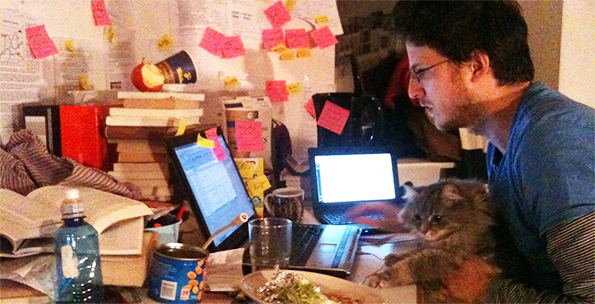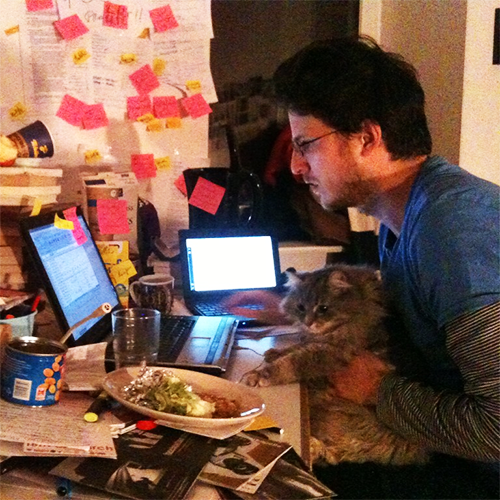
Dear Freelancer,
I am an editor, one of those people you probably consider among the bad guys. I do not guarantee objectivity in what I am about to write, nor do I offer a defence for my fellow editors. I will speak only for myself. I want to give you some advice.
Why? Firstly, because I was asked to by Valigia Blu. Secondly, because I have had good advice from my editors over the years and I know how important it can be. Thirdly, because I would like to offer another point of view – I hope just as dignified as that of freelancers – on the dynamics of newspaper publishing in general and Italian newspaper publishing in particular. And finally, because I have been following the reaction to the article written by Francesca Borri for the Columbia Journalism Review. If her aim was to stimulate a debate, she has certainly succeeded. If she wants, she can accept my insights as a chance to exchange opinions publicly on a subject dear to both of us.
First point. Please update the models of reference. Terzani and Kapuściński have written some great stuff, but today the world – especially the media world – is no longer that of Terzani and Kapuściński.
Writing what one sees is a starting point, but it is not enough. Commercial considerations inevitably intrude. Nowadays a young journalist is digital or else isn’t much of a journalist. And when I say digital, I speak primarily of culture and then of techniques, tools and products, as others have already pointed out.
To calculate how much to pay for a reportage from abroad (it is not one of my duties as I rely on press agencies for the local newspapers which are my editorial responsibility, but the dynamics are not very different) I would start with a total figure for article, photos, possibly video and everything needed for a multimedia and multiplatform storytelling. Making a video clearly has higher costs than writing an article.
You might offer me an article, using someone else for the images (and I imagine the same reasoning applies to creating any video). It’s a legitimate choice, but don’t forget that the total budget per story is always the same. Therefore, if you can’t provide the complete product – because the skills are different – my advice is to create a partnership with photographers and video-makers. In this way you make my job easier, as I can speak to one person and manage the transaction once, knowing that I already have a multimedia product rather than bits and pieces of content which need to be assembled later (the difference is substantial, believe me).
Live and digital coverage of your story through tweets and/or a blog, plus the selection and screening of sources on social networks, are fundamental.
Regarding social networks, do not overlook your active presence on Twitter and Facebook. If you haven’t done so yet, create your own page where an editor can see your previous work and where, above all, you can begin to build a network. This network will increasingly have an economic value. If I have to estimate how much to pay you, I need to understand what your sharing power is, and how the article will be read on Twitter and Facebook thanks to your personal contacts.
In addition, I want to be able to evaluate your ability to manage the development of the story, both in the mainstream but especially on social networks; providing explanations, accepting suggestions and additions, creating a constructive relationship with the user/reader. How can this extra work be quantified? I don’t know, but I do know that it will become increasingly important.
More generally, I agree with you when you call for greater solidarity and cooperation among freelancers. And I would go further, imagining an economic model that does not exist in Italy yet but towards which everybody should strive: the use of services by newspaper publishers.
Join together, create companies or cooperatives, study forms of co-working in order to cut costs, have more bargaining power and offer more competitive products. The case of China Files is exemplary.
This has already been done by small press agencies, but one of the undoubted benefits of the competition triggered by new technologies is that all relationships can be redesigned. Above all, you must learn to become sellers of yourself.
News is now a commodity, a fungible good. It’s up to you to convince me of the added value of your offer, of the reason why I should pay you for something I can find elsewhere, For this reason what you propose must be 100% accurate, even if the final check is my responsibility. And I will pay you only if I trust you.
Be very careful with details. If you send me something erroneous which I publish, it will be my responsibility. An inflated, invented or fictional detail can ruin a good piece of work. And remember the judge is not me. The judge, your only point of reference, is the reader/user. You must, we must, answer to the reader/user for your/our inaccuracies. Always.
That said, if you love this profession and you have realised that newspaper publishers simply don’t have the resources, desire or courage to finance your passion, look elsewhere.
Crowdfunding is a possibility. If you are convinced there is an audience for your reportage, ask the public to support it financially. Another possibility is institutional support. Knock on the doors of public and private foundations that may be interested in your projects. It isn’t easy, I know, but it’s an alternative to being at the mercy of editors and their shortsightedness.
And last but not least, never stop studying. This profession (perhaps better to call it “role” because even if the profession of journalism disappears the role will not) requires continuous updating. Beware thinking you’re an expert in something, beware trying to fool the reader. You might get away with it once or twice, but not more. There will be always someone out there who knows more than we do, who has the time and energy to really check what we’re writing.
Good night and good luck.


